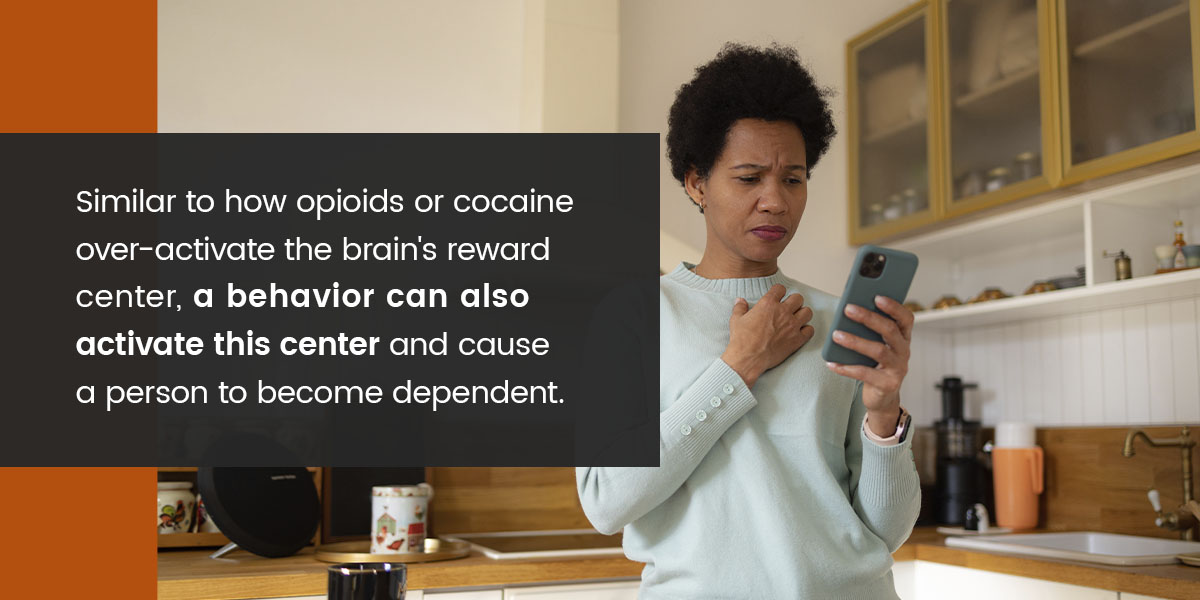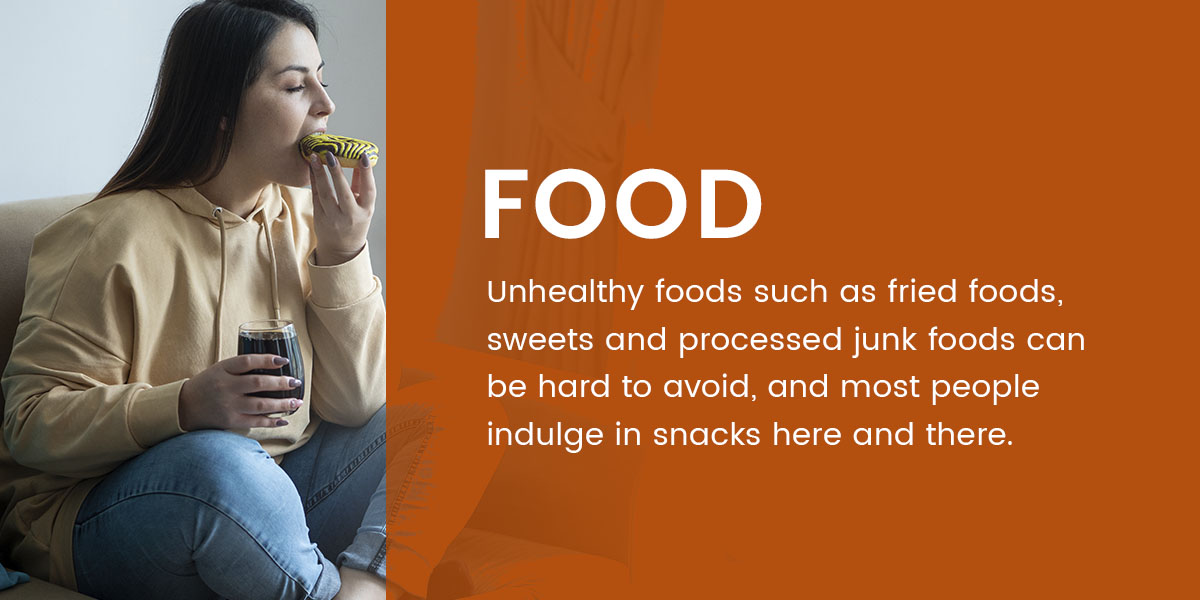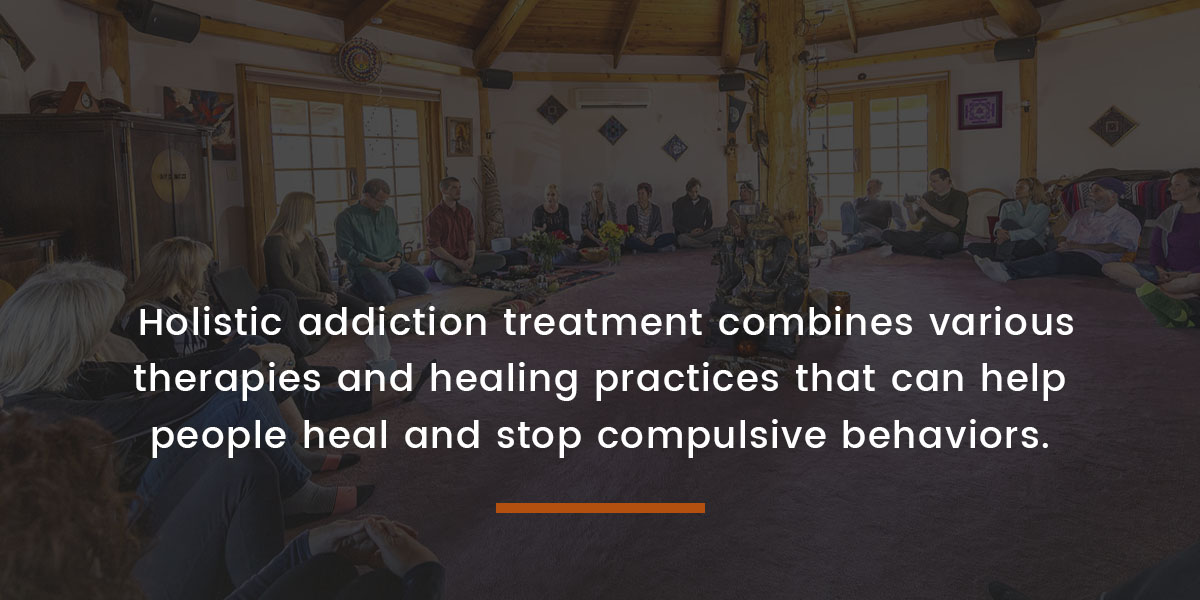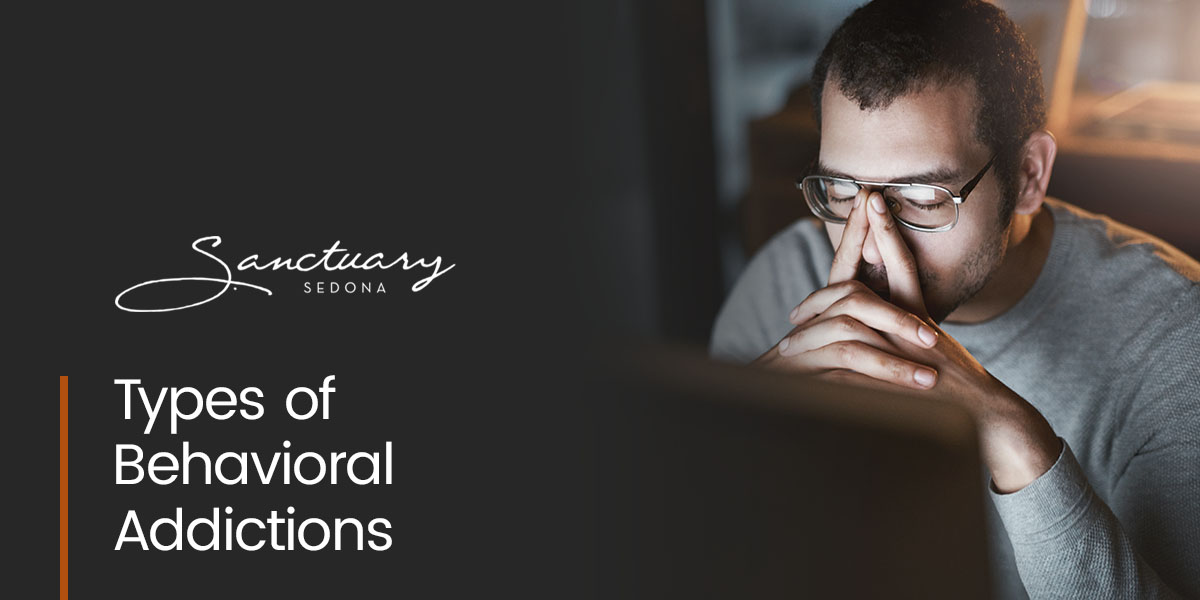Behavioral addictions are also known as process addictions, and they refer to compulsive habits that significantly harm a person’s life and overall well-being. Behavioral addictions, such as compulsive shopping, gambling, and sex, affect the same regions of the brain as substance use disorders, making it challenging to stop unhealthy habits. Holistic behavioral addiction treatment provides a way for individuals to find healing and freedom from addiction.
What Is Behavioral Addiction?
A behavioral addiction is the compulsive engagement in a particular behavior to chase the feeling it invokes. When people think of addiction, they often think of substances such as drugs and alcohol. However, individuals can also become addicted to certain behaviors and engage in them at unhealthy levels.

Behavioral addictions resemble substance use disorders in the ways they impact the brain. Similar to how opioids or cocaine over-activate the brain’s reward center, a behavior can also activate this center and cause a person to become dependent. The brain’s tolerance builds up as an unhealthy activity releases dopamine in the brain, causing an individual to increase unhealthy behaviors to chase the same ‘high’ they previously felt. Behavioral and substance addictions have the following similarities:
- Compulsion or loss of control
- Distress alleviation or a sense of escape
- Mood modification
- Withdrawal and tolerance
- Continuation despite negative impacts and consequences
The main difference between a behavioral addiction and a substance addiction is that a behavioral addiction can be harder to recognize and diagnose. Behavioral addictions cause fewer physical symptoms in the body than substance addictions do, and many of them are considered healthy or non-concerning activities in moderation. For example, shopping is a normal part of life that can become addictive if someone engages in it compulsively.
Most behavioral addictions are not fully recognized in the Diagnostic and Statistical Manual of Mental Disorders (DSM). However, they are concerning conditions that deserve compassionate support and treatment.
Types of Behavioral Addictions
Several different types of behavioral addictions can cause turmoil in a person’s life. Consider the following examples of behavioral addictions and how they can impact you or a loved one:
Shopping
Shopping addiction involves compulsive purchasing that causes problems in life. Many people shop for various purposes and may find it fun, but a shopping addiction causes an individual to use shopping as an escape from painful emotions. You may have a shopping addiction if you notice the following signs:
- Spending more money or time on shopping than you can afford
- Purchasing many things you don’t need or use
- Financial instability or an inability to pay debts
- Shopping to deal with sadness, stress or grief
- Opening new lines of credit without paying off existing card balances
- An inability to stop compulsive shopping despite its negative consequences
- Constantly thinking about items you want or plan to purchase
- Frequently purchasing unnecessary items
- A feeling of euphoria while buying items followed by regret or guilt
- Hiding or lying about purchases
While typical shopping behavior may involve an occasional splurge, shopping addiction involves constant over-spending. People with shopping addiction may shop with others, but they often shop alone to hide their compulsions. There is no clear cause of shopping addiction, but the following factors may play a role:
- Personality characteristics: A person with a shopping addiction may be easily influenced and have low self-esteem. They may also be kind, sympathetic and polite but feel lonely and isolated or purchase items to seek external approval.
- Mental health: Shopping addiction often co-occurs with other mental health conditions such as depression, anxiety, eating disorders and substance use disorders.
- Marketing exposure: External triggers can also cause or intensify a shopping addiction. Advertisements pressure us to purchase products, sending messages that items can resolve our problems. Whether it’s a new beauty product, the latest fashion or a new television, advertisements often target impulse buyers and convince them they need these items to feel whole and happy.
Gambling
Many people gamble as a way to enjoy a night out or a weekend away, but gambling addictions cause individuals to gamble constantly. The rush of taking a risk and the reward when winning money activates the brain’s pleasure centers enough to make a person continue chasing these feelings. They may play games such as the following to escape negative emotions:
- Casino games such as slot machines
- Table games such as blackjack, roulette and poker
- Sports betting
- Lottery and scratch-off tickets
- Horse racing
- Card games
- Online gambling
- Video game gambling
Regular gambling may involve an occasional night at the casino or participation in a fantasy football league, but the following signs can indicate a gambling addiction:
- Spending excessive time or money on gambling
- Continuing to gamble despite accumulating debt
- Using money you need for important expenses such as bills on gambling
- Neglecting work or family responsibilities to gamble
- Hiding or lying about gambling activities
- Feelings of guilt after gambling
- Making increasingly risky bets or gradually betting higher amounts of money
Food

Unhealthy foods such as fried foods, sweets and processed junk foods can be hard to avoid, and most people indulge in snacks here and there. However, food addiction is a more serious compulsion that can cause the following symptoms:
- Frequent food cravings
- Craving unhealthy foods even when you feel full
- Food cravings that follow a nutritious meal
- Eating more food than intended
- Eating until you feel excessively full or uncomfortable
- Making excuses to justify overeating or indulging in unhealthy food
- Continuing to eat unhealthy foods despite feelings of guilt or discomfort
- Consistent, unsuccessful attempts to stop eating a certain food
- Setting rules for particular foods, such as only allowing yourself to eat them on certain days
- An inability to control the consumption of certain foods despite knowing they can affect your health negatively
- Hiding or lying about unhealthy food consumption
Exercise
Even an extremely healthy activity such as exercise can become an addiction if someone engages in it at an extreme level. Exercise is essential for leading a healthy lifestyle, but it becomes an addiction when an individual overindulges in abnormal exercise habits and patterns despite their negative effects. You may have an exercise addiction if you experience:
- Excessive exercise despite injuries or negative health effects
- Withdrawal symptoms such as mood swings during long periods without exercise
- An inability to control the desire to exercise
- Neglecting responsibilities, relationships and other hobbies to exercise
- Spending most of your time recovering from or preparing for workouts
- Decreased social activity
- Unhealthy weight loss
An exercise addiction can make it challenging to alter your workout routines to your body’s limitations. For example, this addiction may make you run to the point of exhaustion or lift heavier weights than your body can handle. While this type of addiction may seem harmless, it can lead to serious injuries or health complications.
Internet
Internet addiction is also known as problematic internet use (PIU), and it’s a harmful preoccupation with digital media and technology. The internet continues to consume more of our time due to advancements such as online shopping, banking, meal delivery and social media apps. However, an internet addiction causes a person to use the internet at an unhealthy level. You may have an internet addiction if you or your loved ones notice the following signs:
- Spending many hours each day on non-work-related internet activities such as social media and online gaming
- Withdrawal symptoms such as anxiety, mood swings and irritability when not using the internet
- An inability to control internet use or your time spent on the internet
- Needing a new online activity or game to feel good or content
- Neglecting work and family responsibilities to engage in internet use
- Social isolation due to your time spent online
- Continuing internet use despite work, academic, family or social conflicts
Internet addiction often co-occurs with conditions such as depression, ADHD and anxiety, and these conditions may be the cause of internet addiction in some individuals. People use the internet to escape in various ways. For example, someone may escape into the fantasy world of a video game or seek emotional validation through social media interactions and ‘likes.’ This can also overlap with shopping addiction because an individual may spend hours online shopping or adding items to online shopping lists.
Sex
Engaging in and enjoying sex is healthy, but sex addiction causes a person to engage in sexual activities despite the negative effects on their life. For example, they may cheat on their partners, engage in high-risk sex with multiple individuals, compulsively view online porn or seek prostitution services. Sex addiction is an unhealthy escape from life’s hardships rather than a healthy desire for intimacy, so an individual with this addiction may eventually stop enjoying sex but continue the pattern anyway. Sex addiction can cause the following consequences in a person’s life:
- Conflict in relationships
- Loss of relationships
- Sexually transmitted diseases (STDs)
- Career interference
- Increased risk of co-occurring conditions such as drug or alcohol addiction
A person with a sex addiction is in pain and acts out of an internal struggle. They often have deeper, unmet emotional needs from their childhood and engage in sex to meet these needs. They may have experienced childhood abuse, trauma or neglect, causing them to lack a sense of self-love. Sex becomes a way for them to temporarily fill their emotional needs but leaves them feeling intense shame and guilt.
Codependency
Codependency involves dysfunctional relationship behaviors such as people-pleasing, putting others’ needs before one’s own needs, and feeling responsible for a loved one’s behavior. Codependency is common in relationships and families where substance use occurs, and codependent individuals typically feel that they need to help or rescue people from their problems. However, people can develop codependency regardless of whether their loved ones have addictions.
Factors such as childhood abuse, dysfunctional family systems, and addiction are some of the main causes of codependency. Some refer to codependency as a ‘relationship addiction’ or describe it as a need to feel needed by another. You may be codependent if you exhibit the following behaviors:
- Sacrificing your needs and well-being to meet another’s needs
- Difficulty saying ‘no’ to requests
- Being careful or overly accommodating to avoid conflict
- Over-apologizing or apologizing for situations you are not responsible for
- Making yourself uncomfortable to please or impress others
- Compulsively devoting most or all of your free time to another person
- Enabling harmful behavior or going out of your way to help people avoid the natural consequences of their actions
- Losing your sense of self in relationships
- Difficulty setting personal boundaries
- Feeling low self-worth and seeking validation to raise self-esteem
- Difficulty communicating and using manipulation to have needs met
- Trying to control another’s behavior through manipulation
Caring about loved ones is healthy. However, relying on another’s dependency upon you to affirm your worth and identity can harm you and the other person. If you are codependent, you may find it challenging to leave unhealthy or abusive relationships, and you could potentially face health complications as you neglect your well-being for another.
Do Behavioral Addictions Require Treatment?
Most people hold the false belief that treatment is only for substance use disorders. However, treatment for behavioral addiction is just as necessary as it is for substance use disorders. While substance use disorders typically require more medical treatment than behavioral addictions, individuals with behavioral addictions can still benefit from supportive treatment. Holistic addiction treatment combines various therapies and healing practices that can help people heal and stop compulsive behaviors.

Effective Behavioral Addiction Treatment
The Sanctuary at Sedona offers a wide range of addiction treatments to heal your addiction holistically. Whether you have a behavioral or substance addiction, or both, our integrative approach can help you recover emotionally, physically, mentally and spiritually. Our compassionate staff combines practices and therapies such as the following to provide personalized, evidence-based treatment:
- Individual and group talk therapy
- Cognitive behavioral therapy (CBT)
- Art, music and guided imagery therapies
- Yoga and movement therapies
- Mindfulness and meditation
- Eye movement desensitization and reprocessing (EMDR)
- Breathwork
- Body image therapy
- Acceptance and commitment therapy (ACT)
- Jungian shadow work
- Somatic experiencing (SEP)
- Inner child therapy
- Gestalt therapy
- Biohacking Lab
- Creative visualization and rites of passage
- Emotional self-regulation skills training
- Recovery-focused diet and nutritional education
Heal From Behavioral Addiction at The Sanctuary
Behavioral addictions may seem vastly different from substance use disorders, but they have a similar impact on the brain and can cause just as must turmoil in a person’s life. A behavioral addiction can disrupt daily life, break down relationships, damage your health and cause financial stress. If you or a loved one is experiencing a behavioral addiction, The Sanctuary can help. Our holistic, non-12 step approach can help you find the healing and relief you deserve.
At The Sanctuary, we strive to help individuals find hope even if they have tried to recover unsuccessfully in the past. If you find that traditional recovery programs leave you with unmet needs, consider trying a new approach. From spiritual meditation and shadow work to yoga and talk therapy, we address each part of you that needs healing and tailor treatment to your preferences. Contact us to learn more about integrative addiction treatment and how The Sanctuary can help you recover from compulsive behaviors.


